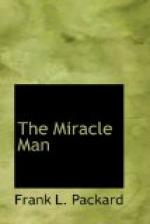Pale Face Harry raised his eyes, lowered them, kicked at a clod of earth with the toe of his boot—and raised his eyes again.
“Say,” he blurted out, “I’m through, Doc. I’m—I’m going to quit.”
Into Madison’s stumbling brain leaped and took form but one idea—and he jumped forward, reaching savagely for Pale Face Harry’s throat.
“You’d throw me, would you! You’d throw the game—would you!” he snarled, as his fingers locked.
Pale Face Harry, twisting, wriggled free—and retreated a step.
“No; I ain’t!” he gasped—and then his sentences came tumbling out upon each other jerkily, as though he were trying to compress what he had to say into as few words as possible and as quickly as he could, while he watched Madison warily. “I ain’t throwing nothing. I just want to quit myself. I keeps my mouth shut—see? I don’t want none of the share what’s coming. Say, I’ve got more’n a hundred times that out of it. Look at me, Doc! Say, I’m like a horse. That’s the Patriarch and living honest. Say, in all me life I never knew what it was before till we comes here. If I took the dough what’s coming I’d go back to the old hell, and I’d go down and out again. Say, it ain’t worth it, there’s nothing in it. I ain’t throwing you, Doc—I just blows out of here with me trap closed. Say, look at me, Doc—don’t you get what I mean?”
And then Madison burst into a peal of wild, strange laughter; and, as though no man stood before him, started on along the path—and Pale Face Harry sidled out of his way and stared after him.
“For—for God’s sake, Doc,” he called out, stammering, “what’s the matter?”
But Madison made no answer. He heard Pale Face Harry call out behind him; in a subconscious, mazed way, he sensed the other following him, gropingly, hesitantly, for a few yards, then hold back—and finally stop.
The path swerved. Madison went on—blindly, mechanically, as though, once set in motion, he must go on. Some ghastly, unnatural thing was clogging his brain; not only in a mental way, but clogging it until there was physical hurt and pain, an awful tightness—something—if he could only reach it with his fingers and claw it away! There was black madness here, and a pain insufferable—a damnable impotence, robbing him of even the power, the faculty to think or reason, or to make himself understand in any logical degree the meaning or the cause of this thing that sent his brain swirling sick.
He halted. His lips were working; the muscles of his face quivered. And suddenly, snatching his hat from his head, he flung himself on the ground and plunged face and head, feverishly, tigerishly, into the little brook that ran beside the path. Again and again he buried his face in the cold, clear, refreshing water—and then, still on hands and knees, he raised his head to listen. Softly, full of a great peace, full of a strange sweetness that knew no discord, no strife, the notes of the chapel bell floated across the fields. Evening had come; the day’s work was done—it was benediction time. It was the call of the faithful—the Angelus of those who believed.




